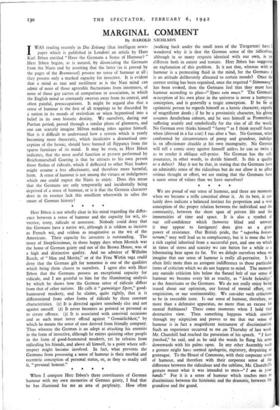We are proud of our sense of humour, and there
are moments when we become a trifle conceited about it. At its best, it cer- tainly does indicate a balanced instinct for proportion and a wise conception of the proper relation between the individual and the community, between the short span of private life and the immensities of time and space. It is also a symbol of our self-confidence which (however blind and unwary it may appear to foreigners) does give us a great power of resistance. Our British pride, the " superbia britan- n orum," may well lead us to complacency, but it is none the less a rich capital inherited from a successful past, and one on which in times of stress and scarcity we can batten for a while as a hibernating bear upon its fat. Yet we delude ourselves when we imagine that our sense of humour is really all-pervasive. It is often little mdre than an arrogant indifference to those particular items of criticism which we do not happen to mind. The moment any outside criticism hits below the flannel belt of our sense of humour we become every bit as touchy, as " leicht bekidigt," as the Americans or the Germans. We do not really enjoy being teased about our optimism, our •hatred of mental effort, our empiricism, or our sentimentality. We consider such criticisms to be in execrable taste. Is our sense of humour, therefore, no more than a defensive apparatus, no more than an excuse for mental flabbiness? There come moments when I hold that destructive view. Then something happens which crashes through my scepticism and proves to me that our sense of humour is in fact a magnificent instrument of discrimination. Such an experience occurred to me .on Thursday of last week. Mr. Churchill had reached the peroration of his speech. "1 have finished," he said, and as he said the words he flung his arms downwards with his palms open. In any other Assembly such a gesture might have seemed apologetic, expiatory, despairing or grotesque. To the House of Commons, with their corporate sense of humour, and therefore with their corporate sense of the difference between the ridiculous and the sublime, Mr. Churchill's gesture meant what it was intended to men—" I am in your hands." For it is a sense of humour which teaches men to discriminate between the histrionic and the dramatic, between the grandiose and the grand.


























 Previous page
Previous page